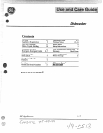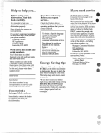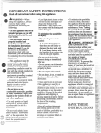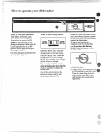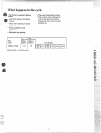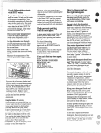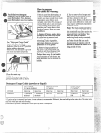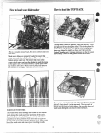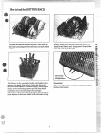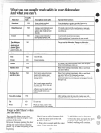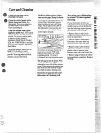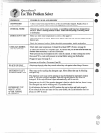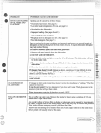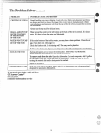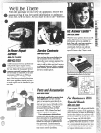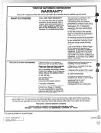
Toget dishescleananddry,you
needhotwater.Tohelpyougetwater
ofthepropertemperature,your
dishwasherautomaticallyheatsthe
walerinthewashcycle.Forgood
washinganddrying, theentering
watermust beat least
120%.To
preventdishdarnage,inletwater
shouldnotexceed150“F.
How
totestwater temperature:
Checkthewatertemperature
insideyourdishwasherwitha
candyormeatthermometer.
Let
the dishwasherrun through
onefill and pumpout cycle,then
letthe dishwasherfill withwater
thesecond time.
Whenyouhearthewaterstop
filling,unlatchthedoorandslowly
openit.
.Measurethetemperatureofthe
waterinthebottomofthetubthis
way:
Removethesilverwarebasketand
placea candyor meatthermometer
in thewatertowardsthemiddleof
{hetub.If thetemperatureisless
than120°F,youwillnotgetgood
washingresults.Higherwater
temperatureisneededtodissolve
~’reaseandactivatepowder
Detergents.
Helpfulhints: If outside
temperaturesare unusuallylow,or
if yourwatertravelsa longdistance
fromwaterheatertodishwasher,
JOUmayneedto setyourwater
~water’sthermostatup.If youhave
notusedhotwaterfor sometime,
d]ewaterinthepipeswillbecold.
Turnonthehotwaterfauce~at the
sinkandallowitto run untilthe
~)ateris hot. Thenstartthe
dishwasher.If you’verecentlydone
l:iumjryor run hoiwaterfor
showers,giveyourwaterheater
timetorecoverbeforeoperatingthe
dishwasher.
Toimprovewashabilityifthewater
islessthan120°Fandyoucannot
adjustyourwaterheater:Selecta
longercycleandfillbothdetergent
cupsalleasthalf-fullwithdetergent.
Help prtWent
spotting
with $3rin$eagent.
Arinseagentmakeswaterflowoff
dishesquickerthanusual.This
lessenswaterspottingandmakes
dryingfaster,too.
Forbestdishwashing
performance,useofarinse
agentsuchasJET-DRYbrandis
recommended.
Rinseagentscomeineitherliquid
or solidform.Yourdishwasher
usesthesolidform.
If youcan’tfind anyrinseagent,
write:
BENCKISER
CONSUMER
PRODUCTS,INC.
(“JETDRY”)
411W.PutnamAve.
Greenwich,CI’06830
Howto$hooseanduse
the
rigmddmgente
First,useonly powderor liquid
detergentspecificallymadefor
usein dishwashers.other types
wiilcauseowmudsing.
$ecmd, deck thephosphate
content.Phosphatehelpsprevent
hard-w~termaterialsfromforming
spotsor filmonyourdishes.If
yourwaterishard(7grainsor
more),yourdetergenthastowork
harder.Detergentswithahigher
phosphatelevelwillprobablywork
better.If thephosphatecontentis
low(8.7%or less),you’llhaveto
useextradetergentwithhardwater.
Your
waterdepartmentcan tell
youhow
hard yourwateris. So
canyourcountyextensionagent.
Or yourarea’swatelsofkner
company,Justcallandaskthem
howmany“grains”ofhardnessis
inyourwater.
Howmuch
detergentshouid you
use?Thatdepends.Isyourwater
“hard”or “soft”?Withhardwater,
youneedextradetergenttoget
dishesclean.Withsoftwater,you
needlessdetergent.
Toomuchdetergentwithsoftwater
notonlywastesmoney,itcanbe
harmful.Itcancausea permanent
cloudinessofglassware,called
“etching.”Anoutsidelayerofglass
isetchedaway!Butwhytakea
chancewhenit’seasyto findout
thehardnessofyourwater.
Keep your detergentfresh and
dry.
Underthesinkisn’ta good
placetostoredetergent.Toomuch
moisture.Don’tputpowder
detergentintothedispenseruntil
you’rereadytowashdishes,either.
(Itwon’tbe freshORdr-y.)
E your powder detergent gets old
or hmpy9 throw it away.
It w-on’t
washwell.Olddetergentoftenwon’t
dissolve.
If youusea liquiddishwasher
detergent,theseprecautionsarenot
necessarybecauseliquiddetergents
don’t“lump”astheyageor come
incontactwithwater.
6
—. .—— —- —..
--- .. - .. ---- ...-. —-
,--—.—
p..”.



